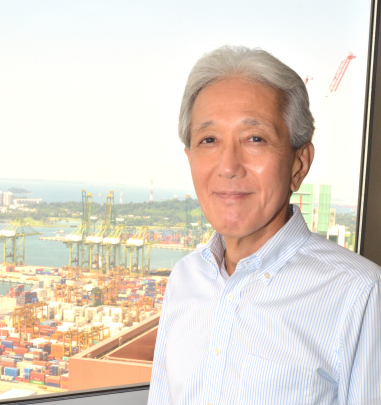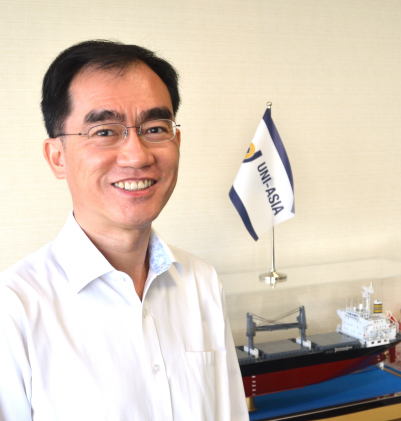|

“As our chartering fleet is quite young and reasonably affordable, we enjoy a competitive advantage in the market.”
– Mr Michio Tanamoto
Group Chairman and CEO
(Photo by Sim Kih)
|
UNI-ASIA HOLDINGS’ diversification strategy has been mitigating its exposure to the shipping market downturn.
The Group’s 2QFY2016 fair value gain on its property development projects in Hong Kong and Japan helped it to return to profitability after a loss during the first quarter.
2QFY2016 net profit attributable to shareholders was US$960,000 compared to a loss of US$725,000 in 1QFY2016.
| Uni-Asia |
S$1.045 |
| 52-week range |
S$1.00-S$1.355 |
| Market cap |
S$49.1 million |
| PE (ttm) |
- |
| Dividend yield |
5.98% |
| Net asset value |
US$3.02/share |
| Source: Bloomberg, Company |
|
In 2014, the Group invested US$10.4 million in its second Hong Kong property project at 650 Cheung Sha Wan Road for the development of a commercial office building. During 2QFY2016, fair value gain on this property amounted to US$2.7 million.
The Group also had fair value gain from small residential property development projects that amounted to US$2.2 million.
The Group's small residential property projects in Tokyo involve the redevelopment of investment sites into 4 to 5 storey buildings with 10 to 30 units of studio or maisonette type flats. These projects are marketed under the brand name “ALERO”.
For more information on its 2QFY2016 results, refer to its corporate presentation here.
|
At the Group’s 2QFY2016 results briefing on Tuesday (23 August), its Chairman and CEO, Mr Michio Tanamoto, Group CFO, Mr Lim Kai Ching, as well as its Senior Managing Director of Property Investment, Mr Masahiro Iwabuchi, provided updates on the trends affecting the Group's business outlook.
| ♦ Promising Hong Kong Office Sector |
|
“We are focusing on the office sector in Hong Kong because of its promising outlook. Our third Hong Kong property project is located near container terminals. We expect strong demand for this building as there are not many commercial buildings there.
|

“We have a positive operating cash flow and we are cautious about cash management.
“Before making any investments, we deliberate carefully on the project cash requirement, our funding sources and whether we should work with joint venture partners. This enables us to strike a balance between investing for future returns and meeting our immediate cash needs.”
– Mr Lim Kai Ching
Group CFO
(Photo by Sim Kih)
|
“The Hong Kong government has been focusing on cooling the exorbitant home prices in its residential property market. That is why most of the land that it releases for tender is designated for the development of residential projects.
“Only 10% to 15% of government land released for tender is for commercial development. Demand for commercial office space in Hong Kong is driven by PRC financial companies, as well as by local Hong Kong companies.
“That is why the Hong Kong commercial property market is relatively isolated from global economic headwinds.
“Currently, the following 3 trends support demand for our projects:
- Spillover demand from industrial buildings: Recently, an industrial building fire killed 2 firemen. The incident prompted the government to roll out new guidelines that prohibited space in industrial buildings without fire prevention sprinklers from being as offices.
As the affected tenants have to relocate to buildings with sprinklers, demand for office space could spill over to commercial buildings located in areas dominated by industrial buildings.
- Property investors shifting focus from the weakening residential property sector to the commercial office sector.
- En bloc demand of commercial buildings from large PRC corporates.”
|








